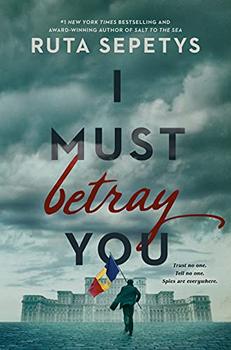Reading Guide Questions

Please be aware that this discussion guide will contain spoilers!
-
"Their bodies were owned by the State" (page 40). In Chapter 10, Cici was visibly affected by the examination with the "baby police" at the factory. The subtext indicates that in Romania, the larger the population, the more prosperous the state. Would you agree that Cristian's mother—who only had two children—felt the pressure of this responsibility for her country? What does that say about women's roles during this time in Romania?
-
The radio is a prized possession in Cristian's household. Bunu even went to great lengths—such as selling cartons of Kents—to fix it. The information it relays isn't trustworthy, yet Romanians listen all the same. Why do you think that is? What does the radio symbolize to them? How does the media, in this context, serve the public?
-
There's a juxtaposition of characterization between Bunu and Cristian's mother. They both react distinctly to Romania's regime—the former being outspoken, the latter discreet. Their contrasting personalities could potentially face consequences for different reasons—but which is more dangerous? What does their personality reveal about them?
-
Cristian realizes that "Mama wasn't angry at Bunu for being ill, but for being a dissident" (Page 157). The woman from Boston, however, consoles Cristian by telling him that "the regime is sick, not you…" (Page 162). The author likens the circumstances happening in the novel to an illness, where it's metaphorical to the regime's deceptions. Do you agree with the comparison?
-
Cristian's notebook turned confessional, Screaming Whispers: An American Teenager in Bucharest, was described as "full of heart, painful truths, and also humor" (Page 277). It's clear that many resonated with his account. What
is it about the written word that possesses such power among Romanians during this time period?
-
Cristian was too fearful to speak up about being an informer, yet the majority of the people he was surrounded by ended up being informers themselves. Do you think the same people would have been receptive if Cristian were honest and upfront about being an informer, or would they have turned on him? Why?
-
How did you feel about Cristian? In what ways did the author develop his character as the story progressed? What prompts him not only to use his voice, but stand up and fight against the regime? Are these actions consistent with his character?
-
Did you know anything about communism in Romania and the Ceaușescu dictatorship prior to reading? If not, were you compelled to further research this? Were there any specific events in the novel that affected you?
-
There was a great amount of symbolism displayed throughout I Must Betray You. Many of the characters sold out their family and friends without knowing that their close circles were equally guilty of the same betrayals. Was
it justifiable for the characters who were informers to feel hurt and betrayed even though they were performing similar acts?
-
"Was that how it was supposed to end? So quickly? I suddenly had an odd, lingering sensation, unsure of what I was feeling. Did we have the full truth? What exactly had happened—and how?" (page 255). After years of repression from the Ceaușescus, why do you think Cristian reacts this way about their deaths?
-
In the end, we learn the painful truth about who betrayed Cristian and the sense of duty they felt to inform. Do you think the lines are blurred here? In what ways was this an example of the regime's deceitful cruelty?
Unless otherwise stated, this discussion guide is reprinted with the permission of Philomel.
Any page references refer to a USA edition of the book, usually the trade paperback version, and may vary in other editions.

 Book Reviewed by:
Book Reviewed by:





